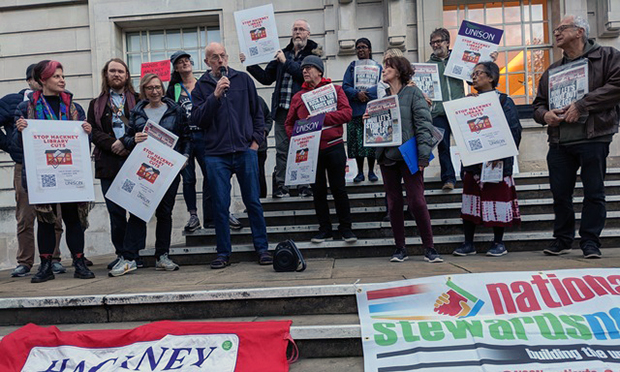Council under fire for using casual library staff contracts – ‘in tension’ with its own policies

Brian Debus, Hackney Unison’s libraries representative, at a 2023 protest. Photograph: Julia Gregory / free for use by partners of BBC news wire service
Hackney Council has been confronted over its use of casual contracts in the borough’s libraries, which critics stress is at odds with the Town Hall’s opposition to zero-hours contracts.
On Monday (20 January), Unison members grilled the local authority on the ongoing impact of multiple job cuts resulting in a growing reliance on temporary “relief” staff.
A report from the union highlighted that temporary employees have “frequently covered over 1,000 hours per month”, and that nearly a quarter of all hours worked in November last year were by these temporary employees.
Libraries representative Brian Debus told the council’s skills, economy and growth scrutiny panel that due to the multiple layoffs as part of the council’s restructure, “on a day-to-day basis, it’s literally a struggle to keep the show on the road”.
“Otherwise, you wouldn’t have those large numbers of relief hours,” he said.
The number of hours worked by relief staff is equivalent to nine full-time employees, and this reliance on casual contracts “is in tension with council policy and Hackney Labour’s position against the use of zero-hours staff”, the report adds.
Hackney’s Labour-run council has not banned the use of zero-hours contracts for the local authority workforce, nor does it have a stated policy around the controversial arrangements.
But it has made clear criticisms of their uses.
The borough’s inclusive economy strategy for 2019-2025 states: “Zero-hours contracts may suit some people, but they create greater job insecurity and can make people more exposed to exploitative practices, because it can be easier to let someone go.”
In October, the local party’s X (formerly Twitter) account shared a video promoting the government’s new Workers’ Rights Bill, which refers to “exploitative zero-hours contracts”.
An earlier post used the statistic “1.1 million workers have zero-hours contracts” as an example of the previous Conservative government’s legacy of “insecure jobs”.
However, the Unison report claims that the council’s terms for its temporary ‘library relief’ workers are an even worse deal — with no protections given through grievance or anti-bullying policies, and no redundancy pay offering.
Petra Roberts, assistant director for libraries, explained that relief staff were not on zero-hours contracts but were “casual workers” taken from a pool of former employees who had accepted voluntary redundancy and then sought more flexible working arrangement.
“It means they don’t have to accept certain hours,” she said, arguing that this had also helped ease the strain caused by staff sickness or other absences.
However, Rebus claimed that the worker’s payroll in fact describes them as “zero-hours” employees. “I’m happy to go with that,” he said.
Unison has put pressure on the Town Hall over its restructuring of libraries ever since the strategy was first announced.
The council cut 19 jobs in 2023 in a bid to prevent establishments from closing down, and since then has made 48 redundancies, either voluntary or compulsory, but 27 of these experienced employees have joined the relief pool.
This required the council waiving its policy of making those given voluntary redundancy wait one year before they could return to work for the council.
Unison representative Nick Panteli said: “Imagine paying someone to leave, only to hire them back almost immediately on less favourable terms.
“It’s not just inefficient. To some extent, it represents public funds that could have been better spent.”
Town Hall bosses had previously floated the option of closing one library, though this has not taken place and faced stiff resistance from Unison.
Updating the council on its strategy, Hackney’s libraries team stated that “staff now receive tailored training and participate in new quarterly staff development days, team building and sharing best practice”.
The borough’s Libraries, Venues and Events Manager Catherine De-Abaitua said this training was available to temporary workers, who were now paid the equivalent of a library assistant “in a previous establishment”.
There are now “higher paid roles, more training, skills development, progression routes for frontline staff”, while the restructure has allowed the council to keep all its libraries open with the same operating hours, the report stated.
A user survey revealed 99 per cent rated library services ‘excellent’ or ‘good’, though only 25 per cent had so far responded.
This article was amended at 14:27 on Tuesday 11 February 2035. The original article incorrectly attributed a quote to Suzanne Johnson, the borough’s strategic director for regeneration rather than Catherine De-Abaitua, the Libraries, Venues and Events Manager. This error has been corrected. – Ed.

Paying people to leave and then rehiring them on less favourable terms is another example of the Mayor's "vision" Like her sponsor Mr Starmer she is a Tory at heart.